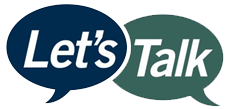
Let’s Talk is an outreach program that provides easy access to informal consultations with counselors from University Counseling Services. Counselors provide drop-in consultation hours at sites around campus throughout the week. There is no fee for this service and no appointment is needed. Students can meet for a consultation on a first-come, first-serve basis. A Let’s Talk counselor is available to listen, offer support, and provide resources and problem-solving tools.
Talking can help.
Whether it is stress, sadness, difficulty adjusting to school, academic concerns, or relationship or family problems, sharing your concerns with another person can make a positive difference. Let’s Talk counselors can talk through your issue with you and help you determine the best way to get help.
Let’s Talk is in an in-person format (unless otherwise indicated below) on the days and times listed below.
Let’s Talk Mondays
- Hillel 818: 3pm to 5pm, facilitated by Eugene Kogosov
- NCOD: 3pm to 4pm, facilitated by Alison Freeman
Let’s Talk Tuesdays
- Athletics: 9am to 11am, facilitated by Amy Rosenblatt
- Pride Center: 3pm to 5pm, facilitated by Pat Alford-Keating, Daniel Alonzo, & Josh Chow (rotates weekly)
- Parent Scholars: 3pm to 4pm, facilitated by Marilyn Mendoza (at The Village)
Let’s Talk Wednesdays
- Omatsu House: 2:30pm to 4:30pm, facilitated by Josh Chow
Let’s Talk Thursdays
- NCOD: 9am to 10am, facilitated by Alison Freeman (via Zoom)
- DREAM Center: 11am to 12pm, facilitated by Juan Ortiz
- Oasis Wellness Center: 12pm to 1:30pm, facilitated by Aida Kohanteb
- Student Housing: 4pm to 5PM, facilitated by Marilyn Mendoza (via Zoom)
Let's Talk Fridays
- International and Exchange Student Center: 2pm to 4pm, facilitated by Sunil Obediah
Let's Talk Frequently Asked Questions
What happens at a visit to Let’s Talk?
Appointments are first-come, first-served. The counselor will listen closely to your concerns and provide support, perspective, and suggestions for resources.
How can I arrange for a Let’s Talk consultation?
Just stop by virtually! Appointments are first come, first serve; usually not much of a wait.
Who should visit Let’s Talk?
This service is open to all CSUN undergraduate and graduate students. Let's Talk is the best fit for the following people:
- Students who are not sure about counseling and wonder what it's like to talk with a counselor
- Students who are not interested in ongoing counseling but would like the perspective of a counselor
- Students who have a specific problem and would like someone with whom to talk it through
- Students who have a concern about a friend and want some thoughts about what to do
I don’t know anything about counseling, would going to Let’s Talk help me figure out if I should go?
Absolutely. The counselor will talk through your issue with you and help you determine the best way to get help. If you feel comfortable with the counselor, it's sometimes possible to meet with them at UCS in an ongoing way.
I’m currently seeing a counselor at UCS, and I would like to talk to someone sooner than my next appointment. Can I go to Let’s Talk?
If your next appointment is not soon enough, it's best to contact your counselor directly to see if they can see you sooner. It’s important to remain consistent with your provider.
I’m currently seeing a counselor at UCS, and I’m not happy with how things are going. Can I go to Let’s Talk instead?
The best thing to do in this situation is to talk directly with your counselor. Counselors are eager to get your feedback, positive or negative. Often, an open conversation about your concern can help. If, after talking with your counselor, you prefer to transfer to someone else, just ask your counselor directly.
Are there any limits to the confidentiality of a Let’s Talk consultation?
Conversations with Let's Talk counselors are confidential, with a few rare exceptions. Counselors may need to share information in an emergency when there is an immediate threat of harm to yourself or others. Counselors are required by law to report when a minor, elderly person, or someone otherwise incapacitated and unable to act on their own behalf is being abused or neglected. We don't want anything to be a barrier to students accessing help. If you have further questions about confidentiality, we encourage you to discuss them with a Let's Talk counselor.
Can Let’s Talk be a substitute for therapy?
Although Let's Talk counselors are mental health professionals, Let's Talk is not a substitute for formal counseling or psychotherapy and does not constitute mental health treatment. Let's Talk is for consultation about a specific problem. Most students come to Let's Talk only once or twice. It is also a place where students are able to have questions answered about formal counseling. Your Let's Talk counselor can help you determine whether formal counseling would be useful for you.










